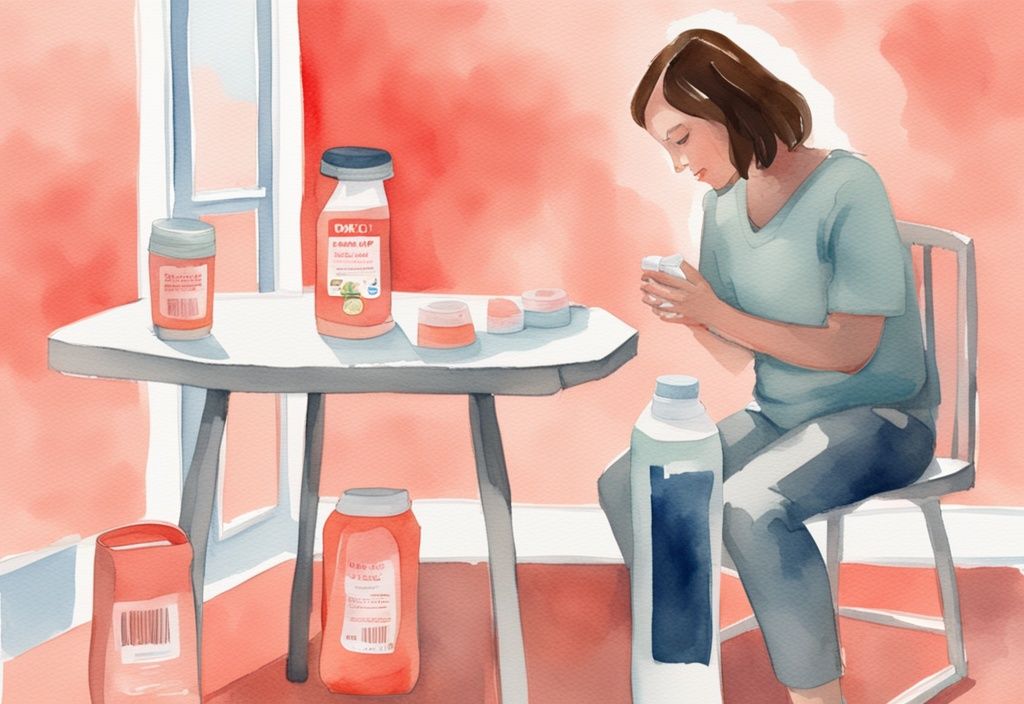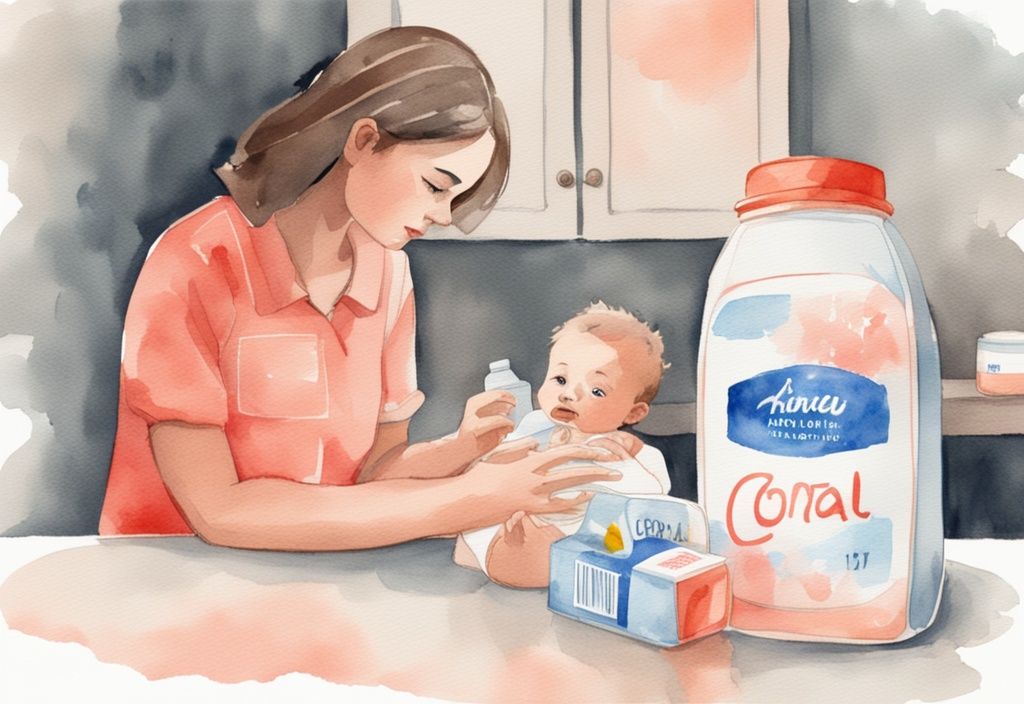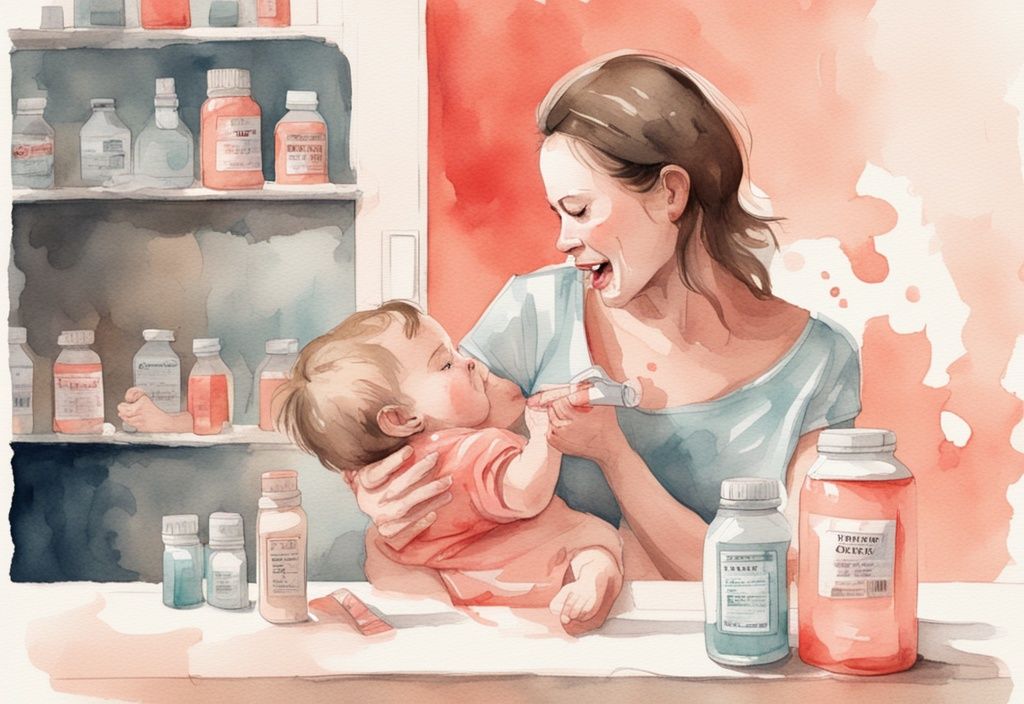Okay, breathe, my friend. Did you know that you’re not alone in accidentally giving your child expired formula? It’s a common concern and I’ve been there too, trust me. Now, here’s what we can do to address this situation.
I want to reassure you first. In this guide, you’ll figure out the immediate steps to ensure your little one’s safety. We’ll discuss recognizing potential health risks and how to spot any symptoms. Don’t worry, I’ve got your back.
Let’s also talk about how to prevent this from happening again. I’ll share practical advice on expiration dates and disposing of old formula effectively. Together, let’s make baby feeding safer and stress-free.
Initial Steps After Feeding Your Baby Expired Formula
It’s an alarming moment when you realize you’ve accidentally given your baby expired formula. Taking prompt and appropriate actions can help safeguard your little one’s well-being.
Monitoring Your Baby for Symptoms
After feeding your baby expired formula, it’s crucial to keep a close eye on them for any signs of distress. Immediate symptoms like vomiting, diarrhea, or increased fussiness may surface quickly, signaling that the expired formula is causing digestive issues.
Secondary symptoms to be aware of include weakness, stomach cramps, abdominal swelling, and a decreased appetite. Your baby might appear lethargic or show disinterest in feeding, which could indicate discomfort or illness. Stay extra vigilant for any unusual changes in your baby’s behavior or physical condition, as these can serve as early warnings that something is amiss.
Understanding the Common Signs of Discomfort
Recognizing common discomfort signs can help you swiftly address any issues stemming from the expired formula. Look for symptoms such as vomiting, diarrhea, stomach aches, fussiness, and abdominal swelling. These can vary in intensity, depending on your baby’s reaction to the expired product.
Dehydration is another critical concern. Watch for signs like fewer wet diapers than usual, absence of tears when crying, and a dry mouth. These symptoms suggest rapid fluid loss, which can become serious. Pay particular attention to more severe signs such as blood in the stool or vomit and a high fever, as these require immediate medical attention.
When to Call Your Pediatrician Immediately
Feeding your baby expired formula can sometimes necessitate immediate medical advice. Persistent vomiting, high fever, or severe diarrhea are warning signs that should prompt you to contact your pediatrician right away. These symptoms can cause rapid dehydration and other complications.
If your baby has more than eight loose stools within eight hours or there is blood in their stool or vomit, seek prompt medical counsel. Similarly, signs of dehydration like absence of tears, sunken eyes, or lack of urine for four-to-six hours must be addressed quickly. Your pediatrician can provide guidance on the next steps to ensure your baby’s safety and well-being.
The Risks of Using Outdated Formula: What You Should Know
How Nutrients Degrade Over Time
Accidentally giving your baby expired formula is a more common mistake than you might think.
Invalid YouTube video ID
While the formula might look okay, beneath the surface, key nutrients critical for your baby’s growth and development start to break down. Vitamins and minerals lose their potency, meaning your little one isn’t getting the best nutritional support. It’s important to remember that expired formula might not show visible signs of spoilage, but its ability to nourish your baby effectively diminishes after the expiration date.

The Danger of Bacterial and Mold Growth
The health risks linked to expired formula can be quite serious, primarily due to potential bacterial and mold growth. These microorganisms thrive in expired formula, even if they’re invisible to the naked eye. Consuming this spoiled formula can lead to foodborne illnesses, which bring nasty symptoms like vomiting, diarrhea, and abdominal cramps. Given that tiny tummies have less-developed immune systems, the impact can be even more severe for infants. Always err on the side of caution and steer clear of expired formula to keep your baby safe from these hidden dangers.
Identifying Spoiled Baby Formula
Knowing how to spot spoiled baby formula is key to protecting your baby’s health. Look for unusual odors, color changes, or an altered consistency. Clumping is a telltale sign of spoilage. Sometimes, the baby might refuse the bottle due to a different taste. Regular checks on any formula nearing its expiration can save a lot of trouble. Be vigilant and trust your senses; it’s an easy step to ensure the safety of what your baby consumes.
Preventing the Accidental Use of Expired Formula
Ensuring that your baby always gets fresh, nutritious formula is essential. Below are some practical tips to prevent the accidental use of expired formula, lovingly compiled to help you manage this aspect of parenting with confidence.
How to Properly Read Expiration Dates and “Use By” Labels
Understanding the nuances between expiration dates and “use by” labels is crucial for ensuring your baby’s safety. The expiration date indicates the last day the manufacturer guarantees the formula’s potency and safety. Consuming formula past this date can lead to reduced nutritional quality and potential health risks.
The “use by” date suggests the timeframe within which the product should be consumed for optimal nutritional benefits. By keeping a keen eye on these dates, you can prevent scenarios where you might think, “I accidentally gave my baby expired formula.” It’s a simple step, but it makes a big difference.
Essential Tips for Safe Formula Storage
Why Room Temperature Storage Matters
Storing formula at room temperature in a cool, dry area is essential to maintain its quality and prevent premature spoilage. Temperatures and conditions in places like stovesides or near windows can fluctuate, compromising the formula’s integrity. A stable environment ensures that the formula remains safe and effective for your baby.
Importance of Moisture Prevention
Tightly sealing the formula container is imperative to keep moisture at bay, as moisture fosters bacterial growth and can cause clumping, indicating spoilage. Moist environments can be detrimental, so always store formula in areas free from humidity to preserve its quality.
Safe Practices for Handling and Mixing Baby Formula
Proper hygiene and precision in preparing baby formula are essential. Thoroughly washing your hands before handling formula helps prevent contamination, ensuring the safety of your baby.
Always follow the mixing instructions on the formula package precisely to maintain its nutritional efficiency. Reusing leftover formula can lead to bacterial growth; therefore, discard any remaining formula in the bottle after feeding. This practice will help prevent bacterial contamination and ensure the safety of your baby’s diet.
Taking these steps can significantly mitigate the chances of ever having to worry, “I accidentally gave my baby expired formula,” ensuring safe and healthy feeding practices for your baby.

How to Dispose of Expired Baby Formula
Navigating the disposal of expired baby formula can be a bit of a maze. It’s crucial to understand both the environmental impacts and responsible practices to manage this effectively. Let’s explore some key points that will help you handle expired formula with care and mindfulness.
Environmental Risks of Using Expired Formula
When I accidentally gave my baby expired formula, I realized how important proper disposal really is. Improperly discarded formula can leach into the soil and contaminate our water supplies. Imagine expired formula left out—it can attract pets or even wildlife, posing health risks. Proper disposal is crucial for your baby’s safety and our planet’s well-being, truly an ecological responsibility.
Environmentally Conscious Disposal
Start by checking your local waste management guidelines—they often offer the best disposal methods to reduce environmental impact. Some areas even have specific disposal services for expired baby products. You might be surprised to learn that unopened, expired formula can sometimes be donated to local food banks or shelters for non-consumable purposes. This way, you prevent waste and support your community!
Unexpected Uses for Expired Baby Formula
Donating to Animal Shelters: Is it Safe?
To minimize waste after I accidentally gave my baby expired formula, I looked into donating it to animal shelters. Some shelters might accept recently expired formula to feed young animals in urgent need of nutrition. It’s essential, however, to check with the shelter first to ensure it’s safe and complies with their guidelines. Remember, not all shelters may accept expired goods.
Using Expired Formula as a Garden Fertilizer: Pros and Cons
Interestingly, expired baby formula can offer nutritional benefits to plants. It’s like giving your garden a boost of calcium and phosphorus. However, be cautious with this practice. Overuse can attract pests or alter the soil pH, which could harm your plants. Use it sparingly and keep an eye on how your garden responds to ensure positive results.
FAQs after Feeding Baby Expired Formula
Can a Small Amount of Expired Formula Harm my Baby?
Even a small amount of expired formula can be worrisome. It might not cause immediate serious harm, but it can reduce your baby’s nutritional intake and introduce bacterial contamination. Keep an eye on your little one for any unusual symptoms and reach out to your healthcare provider if you’re concerned.
What are the Tell-Tale Signs of Spoiling Formula?
Spoiled formula has some clear signs. It might start smelling off, change color, or become clumpy. If your baby rejects the bottle more than usual, it could be due to a taste difference, which often goes hand-in-hand with spoilage.
What are the Long-Term Effects of Feeding Expired Formula?
Consistently feeding your baby expired formula can lead to chronic nutritional deficits over time. The ongoing bacterial exposure might contribute to persistent digestive issues or even the development of food sensitivities. It’s crucial to ensure your baby gets fresh, nutritious formula.
How to Ensure Your Baby Never Consumes Expired Formula Again
Develop a routine to avoid this mistake in the future. Use a strict rotation system for your formula, making sure to use older containers first. Always check the expiration date before opening a new container. Keeping a detailed feeding schedule and record can help prevent any slip-ups.

Conclusion: Navigating the Unexpected Hazards of Parenting
Recognize that mistakes happen and learning from them is key to improving care.
Parenting is full of surprises, and sometimes, mishaps—like feeding your baby expired formula—are part of the package. The most important thing is to learn from these slip-ups and keep moving forward. Embrace each mistake as a learning opportunity, which will ultimately make you a more vigilant and informed caregiver. By acknowledging that perfection isn’t the goal, you can foster a healthier and more forgiving approach to the ups and downs of parenting.
Understand the importance of regularly checking expiration dates and promptly discarding expired formula.
Building the habit of checking expiration dates on baby formula is crucial. Old formula can pose serious health risks to your little one, so regular checks are essential. Make it a routine—mark your calendar or set reminders to go through your baby’s supplies and discard anything expired. This ensures your baby always consumes fresh, safe formula, safeguarding their health and well-being.
Use practical tips for storage and handling to prevent future occurrences.
How you store and handle baby formula can make a world of difference. Keep the formula in a cool, dry place to maintain its quality, away from heat sources like stoves or windows. Always seal the container tightly to avoid moisture and bacteria growth. By following these storage tips, you help guarantee that the formula remains in optimal condition until it’s time to use it.
Consult healthcare professionals for guidance and peace of mind.
If you ever find yourself in the situation of accidentally giving your baby expired formula, reach out to healthcare professionals right away. Pediatricians can offer specific advice and reassurance, guiding you on the steps to take and any potential risks to monitor. This professional guidance not only ensures your baby’s health but also brings peace of mind as you navigate these unexpected parenting challenges.
Reinforce the significance of proper baby nutrition and safety practices.
Proper nutrition is the cornerstone of your baby’s growth and development. For more information on ensuring your child receives good nutrition during these crucial early years, visit the [CDC’s Infant and Toddler Nutrition](https://www.cdc.gov/nutrition/infantandtoddlernutrition/index.html) page. Making sure your baby only receives formula that’s within its expiration date is crucial. Establish a rotation system to use older containers first, and keep a detailed feeding log to avoid mix-ups. By focusing on these safety practices and prioritizing proper nutrition, you contribute positively to your baby’s overall health and well-being.


